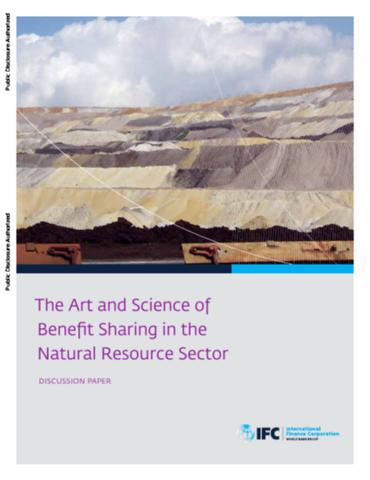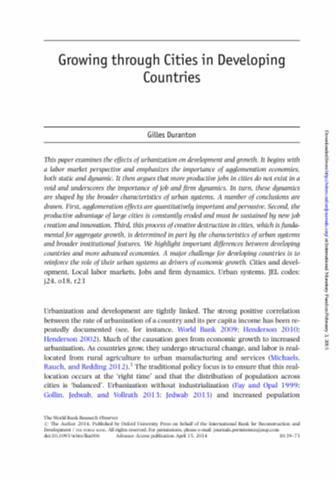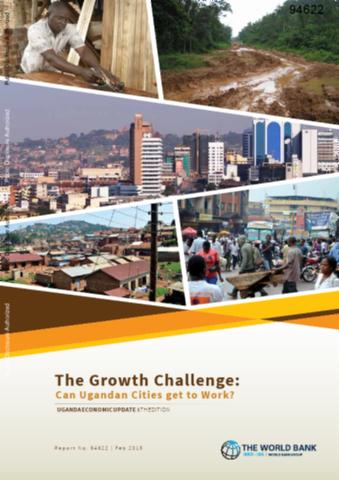The World Bank is a vital source of financial and technical assistance to developing countries around the world. We are not a bank in the ordinary sense but a unique partnership to reduce poverty and support development. The World Bank Group has two ambitious goals: End extreme poverty within a generation and boost shared prosperity.
- To end extreme poverty, the Bank's goal is to decrease the percentage of people living on less than $1.25 a day to no more than 3% by 2030.
- To promote shared prosperity, the goal is to promote income growth of the bottom 40% of the population in each country.
The World Bank Group comprises five institutions managed by their member countries.
The World Bank Group and Land: Working to protect the rights of existing land users and to help secure benefits for smallholder farmers
The World Bank (IBRD and IDA) interacts primarily with governments to increase agricultural productivity, strengthen land tenure policies and improve land governance. More than 90% of the World Bank’s agriculture portfolio focuses on the productivity and access to markets by small holder farmers. Ten percent of our projects focus on the governance of land tenure.
Similarly, investments by the International Finance Corporation (IFC), the World Bank Group’s private sector arm, including those in larger scale enterprises, overwhelmingly support smallholder farmers through improved access to finance, inputs and markets, and as direct suppliers. IFC invests in environmentally and socially sustainable private enterprises in all parts of the value chain (inputs such as irrigation and fertilizers, primary production, processing, transport and storage, traders, and risk management facilities including weather/crop insurance, warehouse financing, etc
For more information, visit the World Bank Group and land and food security (https://www.worldbank.org/en/topic/agriculture/brief/land-and-food-security1
Resources
Displaying 1016 - 1020 of 4907The Art and Science of Benefit Sharing in the Natural Resource Sector
The purpose of this paper is to contribute to theunderstanding and discussion of how the costs andbenefits of natural resource development are sharedacross society. This paper presents how IFC, as both aninvestor and a development organization, determineswhether benefits and costs are shared reasonably, and how this assessment influences IFC’s decision to invest ina particular natural resource project. the goal of the paper is to promotea broad, constructive dialogue across stakeholders—governments, investors, civil society, and others—around benefit sharing.
Growing through Cities in Developing Countries
This paper examines the effects of urbanization on development and growth. It begins with a labor market perspective and emphasizes the importance of agglomeration economies, both static and dynamic. It then argues that more productive jobs in cities do not exist in a void and underscores the importance of job and firm dynamics. In turn, these dynamics are shaped by the broader characteristics of urban systems. A number of conclusions are drawn. First, agglomeration effects are quantitatively important and pervasive.
Uganda Economic Update, February 2015
This Fifth Edition of the Uganda Economic Update presents evidence that if the urbanization process is well managed, it has the potential to stimulate economic growth and to provide productive jobs for a greater proportion of Uganda’s young and rapidly expanding population. In many countries across the world, the growth of cities has stimulated the establishment and expansion of productive businesses by reducing the distance between suppliers and customers. The growth of cities has also facilitated provision of social services and infrastructure through economies of scale.
Solomon Islands
This report aims to build understanding of the existing disaster risk financing and insurance (DRFI) tools in use in the Solomon Islands and to identify gaps where engagement could further develop financial resilience. It also aims to encourage peer exchange of regional knowledge, specifically by encouraging dialogue on past experiences, lessons learned, optimal use of these financial tools, and the effect these tools may have on the execution of post-disaster funds.
Nicaragua Agriculture Public Expenditure Review
Agriculture remains fundamental for
Nicaragua from both a macroeconomic and social view. It is
the largest sector of the Nicaraguan economy, and it remains
the single biggest employer with around 30 percent of the
labor force and including processed foods, like meat and
sugar, agriculture accounts for around 40 percent of total
exports value. Nicaragua appears to be gradually losing
competitive edge of some of its key agricultural exports










